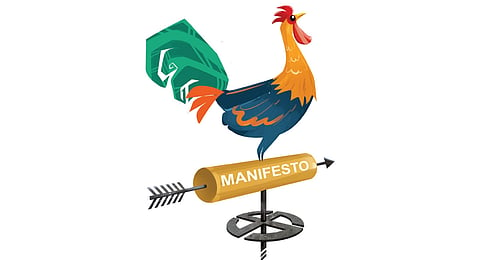

In a world of too much information and data, you can get overwhelmed more often than you like. For savings and investing, making sense of using knowledge is the best way forward.
As India heads into a general election, you may wonder about the impact on your money. With a lot of information thrown at you by political parties, you may want to cut the clutter and focus on simplicity. For that purpose, you need tools that could allow you to establish a correlation between public information available to you and the election outcome. Your savings and investments need a government focusing on economic growth without creating inflation. A government that manages income and expenditure efficiently.
The Reserve Bank of India announced the credit policy last week and released a lot of information in the form of policy statement documents. You can focus on a few data sets that could give you some sense of the ground situation.
The inflation scenario
Politicians do not like high inflation ahead of an election. However, a study published in 2015 by the IDFC Institute highlighted that there was no direct correlation between inflation and election outcome. Governments were re-elected despite high inflation or voted out despite low inflation. Yet, it is not a factor that can be ignored. RBI’s forward-looking surveys capture the general expectation of household price rises.
If households feel the heat of price rise, it would be reflected in the survey. In April 2014, when RBI started the system of bi-monthly credit policy, it published a set of forward-looking surveys. The household inflation expectation survey then suggested that 94.1% of households felt prices would increase in the quarter and a year ahead. In May 2014, India had a change of government.
In April 2019, the survey suggested that 74.8% of households believed prices would increase over the quarter or a year. India went to polls that year, and the incumbent government was re-elected. In the survey published last week, the percentage of households believing that prices would increase is slightly up to 76.5%.
The consumer confidence
The RBI compiles a consumer confidence index. The perception index explains the consumer’s current situation compared to the year-ago period and the perception of the year ahead. It gives a sense of people’s spending based on their income and employment situation. A number over 100 indicates optimism, and a number below 100 indicates pessimism. In March 2014, the current situation index stood at 99.9, while the future expectation index was at 114.9. In March 2019, the current situation index surged to optimism at 104.6, and the future expectation index was at 133.4.
Cut to March 2024, the current situation index fell to 98.4, lower than in March 2014. After the pandemic, the index fell sharply into the pessimism zone and has struggled to move towards the optimism zone. The one-year ahead index stood at 125.2, indicating a lower confidence level than in 2019 but higher than in 2014.
Financial markets
If you look at the trend in the financial markets, volatility rises during elections. There is a sense of calm on the street. The India VIX index represents the volatility in the share prices. In April 2014 and April 2019, it was much higher than it is currently. Similarly, the bond markets do not point to significant risk, with 10-year government bond yields much lower than those ahead of the previous two elections.
What does it mean?
During an election, you must focus on the announcements in election manifestos that sound inflationary. You need a government that concentrates more on keeping inflation in check. If inflation is not an election issue for you as a voter, you must make it. Experts say that voting in India is driven by identity politics more than economic conditions. However, you must focus on your well-being while voting. Your financial security needs your government to have strong finances. If the government policies are inflationary, they may bring short-term relief through cash or tax breaks. However, in the long run, it would bring more inflation and erode the value of your money.
Rajas Kelkar
(The author is editor-in-chief at www.moneyminute.in)